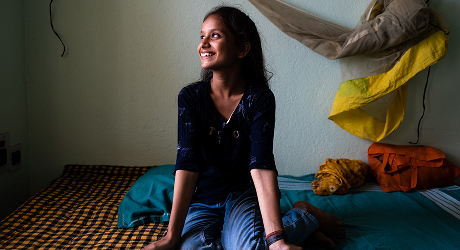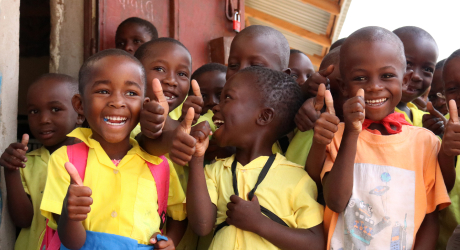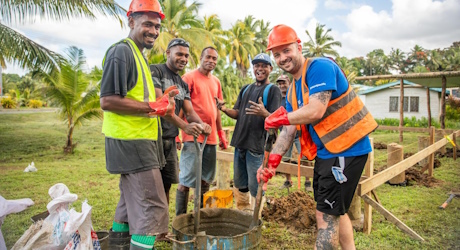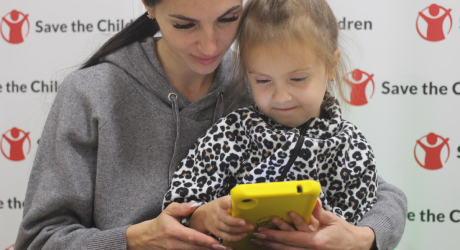Footprints Project
Since 2005, travelers like you have helped us change the world through micro-donations.
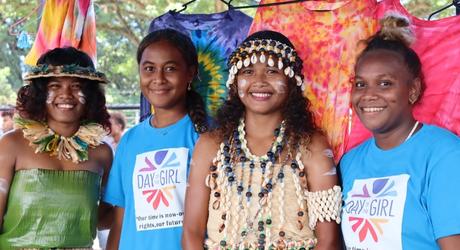
-
A total of
2861
Travelers
-
donated
$18296.3
(121% funded) -
to help improve
Equality
-
impacting
550
people -
in
Solomon Islands
Project Background
Based on global research conducted by Plan International, adolescent girls seldom feel safe in cities. They experience sexual harassment, physical violence, exploitation, insecurity and are often excluded from decision making processes that impact their safety, wellbeing and access to even the most basic services.
A baseline report completed in 2019 showed this was shared by adolescent girls in Honiara. Of the 236 girls who participated only 7% said ‘they always feel safe in public’. The key reasons girls reported for feeling unsafe were the high levels of sexist behaviour and experiences of sexual harassment or fear of experiencing this in public spaces. The top 5 perceived safety risks identified by the research were drunk and intoxicated people, theft, verbal harassment, touching and rape.
Improving safety in public spaces is often considered only a physical problem that can be solved by improving the built environment through improved lighting etc. While these improvements can and do have a significant impact on safety, changing attitudes and behaviours is equally important. The Safer Cities for Girls project in Honiara aims to increase adolescent girls’ safety, mobility and access to public spaces and transport in cities, and to increase adolescent girls’ active and meaningful participation in urban development governance.
Key Project Activities
The Champions of Change curriculum program was delivered to 10 boys and girls clubs to increase their knowledge of gender equality. 5 new communities were identified for inclusion in FY24.
Intergenerational dialogue sessions were held for care givers, parents and local government. Youths presented on what they learnt from the Champions of Change curriculum, issues they face in their communities, and how they can come together with other communities to address issues that affect everyone, especially girls.
Girls clubs participated in community mapping where adolescent girls map the spaces and routes in their city and describe them as safe or unsafe and the reasons for the rating. Following the mapping workshop, girls completed community Safety Walks, walking through those areas identified to build on the safety ratings and collect additional data related to the things that make them feel safe/unsafe. Youth representatives met with Honiara City Council, Transport Department and Waste Management Services to present findings and discuss recommendations/concerns. They also met with a local advocacy group to build influencing capacity for continued engagement with key decision makers.
A clean-up campaign was organised by youth participants across 13 communities. Waste in communities was a key safety issue identified by girls, as walking long distances to dispose of household waste increased vulnerability to violence and harassment. Honiara City council increased resources to manage waste and the campaign was successful in galvanising community action on clean-up day.
Arts advocacy workshops were delivered by local gender-equality activist Loretta Taika to introduce young people to art as a channel for advocacy. Following the workshop, a public art exhibition, Arts advocacy & Art stories, was hosted by young people, showcasing artwork featuring the issues important to them. Challenges and Successes:
The project has encountered challenges in raising awareness in some remote communities but has witnessed considerable success in empowering women economically and educating them about conservation. Positive attitudes from participants have been observed, as evidenced by feedback and engagement in community initiatives.
Key Project Outcomes
- 2,418 young people and community members participated in Safer Cities project initiatives
- Using the skills learned in advocacy, influencing and leadership workshops and training, young people across 13 communities collectively organised a clean-up campaign. Waste in communities was a key safety issue identified by girls as walking long distances to dispose of houshold waste increased vulnerability to violence and harassment. As a result, Honiara City council increased waste collection and disposal options, and the campaign galvanized 700 people participating across communities in a cleanup day.
- 75 young people graduated from the Champions of Change program. Graduates continued to be leaders for change in the Safer Cities program promoting gender equality, youth led change and advocacy in their respective youth groups and broader communities.
- 50 young people were supported to host public art exhibition designed to amplify youth voices and raise community awareness of the issues important to them
- Advocacy and influencing training delivered to 50 young people
- Safer Cities youth clubs participated in a two-day International Day of the Girl event attended by 10 Honiara schools, Permanent Secretary for the Ministry of Women, and Gender Adviser representatives of the Department of Foreign Affairs. Girls from the program lead a number of activities including debates, poetry, keynote speeches, dance and drama performances raising awareness on gender equality and environmental/climate issues.
- Girls club members met with key transport stakeholders to discuss their recommendations for improving girls' safety on public transport. A key change addressed was the need for improved bus services to allow young women and girls travelling at night to only catch one bus rather than need to change multiple times to get home. As a result, Honiara City Council has introduced a new ordinance to regulate bus routes and ensure transport providers are compliant.
Community Involvement
Safer cities has established ongoing quarterly meetings with Honiara City Council Law Enforcement, Transport providers, Royal Solomon Islands Police Force and Honiara City Council Planning Divison. The meetings facilitate girls-led dialogue between youth representatives and stakeholders and provide an opportunity for young people to influence decision makers on the issues affecting girls' safety in the community. Feedback from community representatives show that they are gaining new knowledge in community dialoguing by listening to various experiences presented by Girls;
“Working together can make good changes, if we ignore the issues that are affecting our youths then our country/communities will not be safe for everyone,” said one participant from RSI Police Force
A community leader said that they are happy about the Safer Cities for Girls program and the Champions of Change program. “It has helped youths to understand each other and have more respect for each other which in the past they never do.”
In their own words, youth participants have shared;
“We help each other and we can have a safe community... and our women and girls can walk freely without having fear.” - Agape
“In order for the community to be a safer place for all of us, we need to collaborate. The community working with HCC and HCC working with various NGO’s can altogether change that community.:” - Bruno
“My message to everyone is that we cannot find a solution if we recognise the problem but stay hidden in our homes. So, it is good that we identify issues, understand them, collaborate, and find the right people to seek assistance from. From there, we can address the issues that exist within our communities as a whole.” - Daisy What’s Next?
The project aims to expand its reach to more schools and communities in 2024, continuing to integrate conservation awareness and empowerment. This approach aligns with GZT's holistic conservation strategy, which focuses on benefiting local communities while conserving wildlife.
What's next?
The Safer Cities program is continuing in FY24. The Champions of Change training program will be delivered in a number of additional communities increasing the number of young people involved in the program. Existing Champions of Change Leaders and youth groups will continue capacity building and advocacy engagement with local government and stakeholders. Key initiatives in FY24 include working with public transport providers and developing and disseminating a youth-lead magazine
To respond to the gendered impacts of climate change on urban safety and livelihoods, FY24 will see a slight shift in project activities – expanding the scope of existing outputs to incorporate environmental awareness and climate resilience.
Traveling soon? When you buy travel insurance with us, you can make a contribution towards a cause you care about.
Get a quote